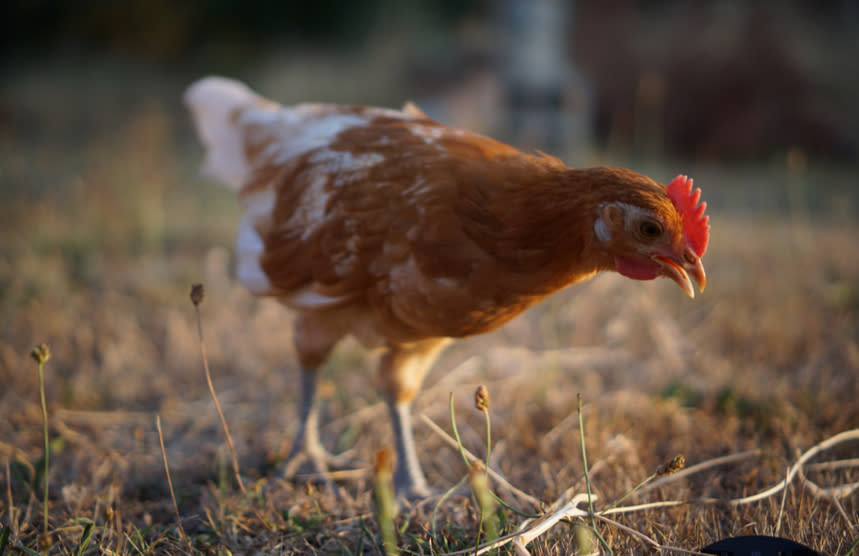




Frankenchickens are unnaturally large birds who have been bred to grow at an accelerated rate, with serious consequences for their welfare.

With more than a billion chickens reared for meat in the UK every year, intensive factory farms have given rise to a type of modern chicken so abnormally large in size that they are destined to suffer extremely short and painful lives. Meet the Frankenchicken.
What makes a chicken a ‘Frankenchicken’?
Frankenchickens are a type of chicken raised for meat (or ‘broiler chicken’) that have been selectively bred to grow 400% faster than is natural for their bodies. Used by most UK supermarkets, the aim is to produce as much meat as possible in the shortest amount of time, despite resulting welfare issues.
This has led to the farming of intensively selected birds who grow faster and larger than their bodies can stand - making them ‘Frankenchickens’ in appearance.
The creation of the Frankenchicken
The intensification of chicken farming began in the late 1940s, when industrialisation encouraged farmers to increase output with new technology, breeding management, and diet modification. By the 1950s, the production of chickens raised for meat had shifted dramatically, with farms producing birds by the tens of thousands.
Back then the average broiler chicken was bred to reach a weight of 905g in about 56 days. However, in the UK today broiler chickens are bred to weigh three times as much, reaching an average slaughter weight of 2.2kg in just 35 days.
To put that into perspective, this would be the equivalent of a human baby growing to the weight of an adult tiger in just two months.
Frankenchicken selection
Since the 1950s, breeding companies have majorly reduced the amount of time that it takes for a broiler chicken to reach the same slaughter weight.
To increase profits and produce the largest amount of meat in as short a time as possible, breeding programmes narrowly focus on selecting traits that are most commercially desirable such as large breast muscle and fast growth rate.
Frankenchicken welfare
As a result of such unnatural growth, Frankenchickens suffer from a whole host of health issues and painful conditions, leaving them unable to express the most basic of natural behaviours. A recent study found that fast-growing birds had the highest incidence and severity of breast muscle diseases such as white striping, which occurs when a chicken’s breast muscle grows so fast that, instead of developing normal muscle tissue, fat cells are formed. This fat appears as white stripes on the breast meat, hence the name.

Fast-growing birds also have a higher incidence of wooden breast syndrome, which is where a chicken’s breast muscles have a hard consistency after death. With a quality of life so poor, chickens with wooden breast syndrome accounted for 70% of the birds found dead or culled before they had even reached the slaughterhouse. This shows the devastating impact that cruel breeding can have on chickens' bodies.
Is this against the law?
The UK law states that animals can only be kept for farming purposes if their genetics don’t cause a detrimental effect on their health or welfare.
It's clear that the genetics of fast-growing Frankenchickens cause them to suffer terribly. Therefore, last year The Humane League UK challenged the practice of breeding fast-growing chickens and filed a judicial review against the Government for its failure to prevent the widespread use of Frankenchickens.
Initially, our case was not taken forward by the judge, but we didn't give up. Our case was granted a full hearing in the High Court in September 2022. This is momentous, as only 5% of judicial review applications are granted a full hearing. We will fight this case with everything we've got.
The fight to end cruel breeding continues
We’ve also been campaigning for companies to commit to improving chicken welfare by adopting the Better Chicken Commitment (BCC). These standards prohibit the use of fast-growing Frankenchickens and ensure that chickens have significantly more space and enrichment, meaning they have a better quality of life.
An analysis carried out by the Welfare Footprint Project found that chickens raised to BCC standards experienced an estimated two thirds reduction in pain defined as 'disabling pain' throughout their lifetimes.
Hundreds of companies have already signed onto the BCC, including KFC, Nando’s and leading supermarkets Waitrose and Marks & Spencer. We’re calling on the other major UK supermarkets, including Tesco, Morrisons, Co-op and Lidl to also address this cruel practice and end the use of Frankenchickens in their supply chains.
Stand up for chickens
You can stand against this cruelty by signing and sharing our petition to ask the remaining supermarkets to make meaningful change for chickens by adopting the Better Chicken Commitment today.

 Lucy Whitnall
Lucy Whitnall






